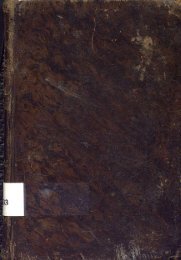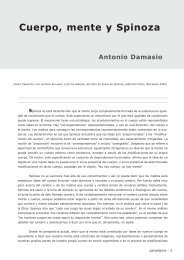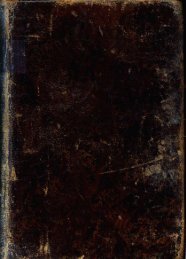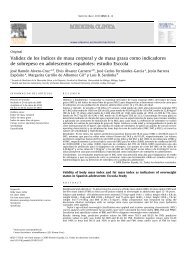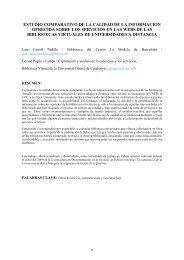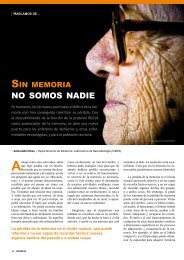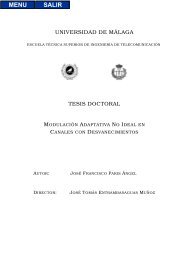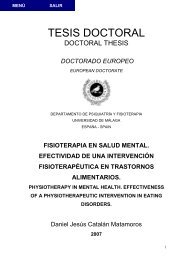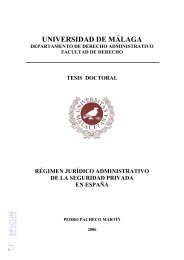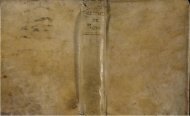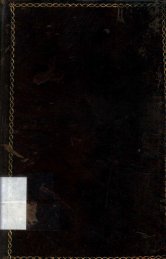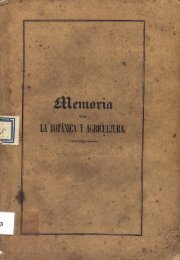- Page 1 and 2: UNIVERSIDAD DE MÁLAGA FACULTAD DE
- Page 3: A mis padres. A mis tíos, Esperanz
- Page 6 and 7: 6 LA VOLUNTAD HUMANA EN TOMÁS DE A
- Page 9 and 10: INTRODUCCIÓN 1. Planteamiento de l
- Page 11 and 12: INTRODUCCIÓN 11 Tomás de Aquino t
- Page 13: INTRODUCCIÓN 13 Vicente Arregui, q
- Page 17 and 18: INTRODUCCIÓN 17 Este descubrimient
- Page 19 and 20: INTRODUCCIÓN 19 elección; o, al m
- Page 21 and 22: INTRODUCCIÓN 21 del mal: “la nec
- Page 23 and 24: INTRODUCCIÓN 23 participó muy act
- Page 25 and 26: INTRODUCCIÓN 25 no puede elegir su
- Page 27 and 28: INTRODUCCIÓN 27 relevante, la trad
- Page 29 and 30: INTRODUCCIÓN 29 cosas descansa no
- Page 31 and 32: INTRODUCCIÓN 31 afirmar o negar, b
- Page 33 and 34: INTRODUCCIÓN 33 necesario, es deci
- Page 35 and 36: INTRODUCCIÓN 35 interés en el cua
- Page 37 and 38: INTRODUCCIÓN 37 ruptura entre libe
- Page 39 and 40: INTRODUCCIÓN 39 psicología y la p
- Page 41 and 42: INTRODUCCIÓN 41 En la actual teor
- Page 43 and 44: INTRODUCCIÓN 43 como potencia o fa
- Page 45: INTRODUCCIÓN 45 Eduardo Ruiz: amig
- Page 49 and 50: CAPÍTULO I EL PROBLEMA DE LA VOLUN
- Page 51 and 52: I. EL PROBLEMA DE LA VOLUNTAD EN LA
- Page 53 and 54: I. EL PROBLEMA DE LA VOLUNTAD EN LA
- Page 55 and 56: I. EL PROBLEMA DE LA VOLUNTAD EN LA
- Page 57 and 58: I. EL PROBLEMA DE LA VOLUNTAD EN LA
- Page 59 and 60: I. EL PROBLEMA DE LA VOLUNTAD EN LA
- Page 61 and 62: I. EL PROBLEMA DE LA VOLUNTAD EN LA
- Page 63 and 64: I. EL PROBLEMA DE LA VOLUNTAD EN LA
- Page 65 and 66:
I. EL PROBLEMA DE LA VOLUNTAD EN LA
- Page 67 and 68:
I. EL PROBLEMA DE LA VOLUNTAD EN LA
- Page 69 and 70:
I. EL PROBLEMA DE LA VOLUNTAD EN LA
- Page 71 and 72:
I. EL PROBLEMA DE LA VOLUNTAD EN LA
- Page 73 and 74:
I. EL PROBLEMA DE LA VOLUNTAD EN LA
- Page 75 and 76:
I. EL PROBLEMA DE LA VOLUNTAD EN LA
- Page 77 and 78:
I. EL PROBLEMA DE LA VOLUNTAD EN LA
- Page 79 and 80:
I. EL PROBLEMA DE LA VOLUNTAD EN LA
- Page 81 and 82:
I. EL PROBLEMA DE LA VOLUNTAD EN LA
- Page 83 and 84:
I. EL PROBLEMA DE LA VOLUNTAD EN LA
- Page 85 and 86:
I. EL PROBLEMA DE LA VOLUNTAD EN LA
- Page 87 and 88:
I. EL PROBLEMA DE LA VOLUNTAD EN LA
- Page 89 and 90:
I. EL PROBLEMA DE LA VOLUNTAD EN LA
- Page 91 and 92:
I. EL PROBLEMA DE LA VOLUNTAD EN LA
- Page 93 and 94:
I. EL PROBLEMA DE LA VOLUNTAD EN LA
- Page 95 and 96:
I. EL PROBLEMA DE LA VOLUNTAD EN LA
- Page 97 and 98:
I. EL PROBLEMA DE LA VOLUNTAD EN LA
- Page 99 and 100:
I. EL PROBLEMA DE LA VOLUNTAD EN LA
- Page 101 and 102:
I. EL PROBLEMA DE LA VOLUNTAD EN LA
- Page 103 and 104:
I. EL PROBLEMA DE LA VOLUNTAD EN LA
- Page 105 and 106:
I. EL PROBLEMA DE LA VOLUNTAD EN LA
- Page 107 and 108:
I. EL PROBLEMA DE LA VOLUNTAD EN LA
- Page 109 and 110:
I. EL PROBLEMA DE LA VOLUNTAD EN LA
- Page 111 and 112:
I. EL PROBLEMA DE LA VOLUNTAD EN LA
- Page 113 and 114:
I. EL PROBLEMA DE LA VOLUNTAD EN LA
- Page 115 and 116:
I. EL PROBLEMA DE LA VOLUNTAD EN LA
- Page 117 and 118:
I. EL PROBLEMA DE LA VOLUNTAD EN LA
- Page 119 and 120:
I. EL PROBLEMA DE LA VOLUNTAD EN LA
- Page 121 and 122:
I. EL PROBLEMA DE LA VOLUNTAD EN LA
- Page 123:
I. EL PROBLEMA DE LA VOLUNTAD EN LA
- Page 126 and 127:
126 LA VOLUNTAD HUMANA EN TOMÁS DE
- Page 128 and 129:
128 LA VOLUNTAD HUMANA EN TOMÁS DE
- Page 130 and 131:
130 LA VOLUNTAD HUMANA EN TOMÁS DE
- Page 132 and 133:
132 LA VOLUNTAD HUMANA EN TOMÁS DE
- Page 134 and 135:
134 LA VOLUNTAD HUMANA EN TOMÁS DE
- Page 136 and 137:
136 LA VOLUNTAD HUMANA EN TOMÁS DE
- Page 138 and 139:
138 LA VOLUNTAD HUMANA EN TOMÁS DE
- Page 140 and 141:
140 LA VOLUNTAD HUMANA EN TOMÁS DE
- Page 142 and 143:
142 LA VOLUNTAD HUMANA EN TOMÁS DE
- Page 144 and 145:
144 LA VOLUNTAD HUMANA EN TOMÁS DE
- Page 146 and 147:
146 LA VOLUNTAD HUMANA EN TOMÁS DE
- Page 148 and 149:
148 LA VOLUNTAD HUMANA EN TOMÁS DE
- Page 150 and 151:
150 LA VOLUNTAD HUMANA EN TOMÁS DE
- Page 152 and 153:
152 LA VOLUNTAD HUMANA EN TOMÁS DE
- Page 154 and 155:
154 LA VOLUNTAD HUMANA EN TOMÁS DE
- Page 156 and 157:
156 LA VOLUNTAD HUMANA EN TOMÁS DE
- Page 158 and 159:
158 LA VOLUNTAD HUMANA EN TOMÁS DE
- Page 160 and 161:
160 LA VOLUNTAD HUMANA EN TOMÁS DE
- Page 162 and 163:
162 LA VOLUNTAD HUMANA EN TOMÁS DE
- Page 164 and 165:
164 LA VOLUNTAD HUMANA EN TOMÁS DE
- Page 166 and 167:
166 LA VOLUNTAD HUMANA EN TOMÁS DE
- Page 168 and 169:
168 LA VOLUNTAD HUMANA EN TOMÁS DE
- Page 170 and 171:
170 LA VOLUNTAD HUMANA EN TOMÁS DE
- Page 172 and 173:
172 LA VOLUNTAD HUMANA EN TOMÁS DE
- Page 174 and 175:
174 LA VOLUNTAD HUMANA EN TOMÁS DE
- Page 176 and 177:
176 LA VOLUNTAD HUMANA EN TOMÁS DE
- Page 178 and 179:
178 LA VOLUNTAD HUMANA EN TOMÁS DE
- Page 180 and 181:
180 LA VOLUNTAD HUMANA EN TOMÁS DE
- Page 182 and 183:
182 LA VOLUNTAD HUMANA EN TOMÁS DE
- Page 184 and 185:
184 LA VOLUNTAD HUMANA EN TOMÁS DE
- Page 186 and 187:
186 LA VOLUNTAD HUMANA EN TOMÁS DE
- Page 188 and 189:
188 LA VOLUNTAD HUMANA EN TOMÁS DE
- Page 190 and 191:
190 LA VOLUNTAD HUMANA EN TOMÁS DE
- Page 192 and 193:
192 LA VOLUNTAD HUMANA EN TOMÁS DE
- Page 194 and 195:
194 LA VOLUNTAD HUMANA EN TOMÁS DE
- Page 196 and 197:
196 LA VOLUNTAD HUMANA EN TOMÁS DE
- Page 198 and 199:
198 LA VOLUNTAD HUMANA EN TOMÁS DE
- Page 200 and 201:
200 LA VOLUNTAD HUMANA EN TOMÁS DE
- Page 202 and 203:
202 LA VOLUNTAD HUMANA EN TOMÁS DE
- Page 204 and 205:
204 LA VOLUNTAD HUMANA EN TOMÁS DE
- Page 207 and 208:
INTRODUCCIÓN: RAÍCES Y RAZONES DE
- Page 209 and 210:
SEGUNDA PARTE: INTRODUCCIÓN. 209 n
- Page 211 and 212:
SEGUNDA PARTE: INTRODUCCIÓN. 211 t
- Page 213 and 214:
SEGUNDA PARTE: INTRODUCCIÓN. 213 n
- Page 215 and 216:
SEGUNDA PARTE: INTRODUCCIÓN. 215 l
- Page 217 and 218:
SEGUNDA PARTE: INTRODUCCIÓN. 217 A
- Page 219:
SEGUNDA PARTE: INTRODUCCIÓN. 219 h
- Page 222 and 223:
222 LA VOLUNTAD HUMANA EN TOMÁS DE
- Page 224 and 225:
224 LA VOLUNTAD HUMANA EN TOMÁS DE
- Page 226 and 227:
226 LA VOLUNTAD HUMANA EN TOMÁS DE
- Page 228 and 229:
228 LA VOLUNTAD HUMANA EN TOMÁS DE
- Page 230 and 231:
230 LA VOLUNTAD HUMANA EN TOMÁS DE
- Page 232 and 233:
232 LA VOLUNTAD HUMANA EN TOMÁS DE
- Page 234 and 235:
234 LA VOLUNTAD HUMANA EN TOMÁS DE
- Page 236 and 237:
236 LA VOLUNTAD HUMANA EN TOMÁS DE
- Page 238 and 239:
238 LA VOLUNTAD HUMANA EN TOMÁS DE
- Page 240 and 241:
240 LA VOLUNTAD HUMANA EN TOMÁS DE
- Page 242 and 243:
242 LA VOLUNTAD HUMANA EN TOMÁS DE
- Page 244 and 245:
244 LA VOLUNTAD HUMANA EN TOMÁS DE
- Page 246 and 247:
246 LA VOLUNTAD HUMANA EN TOMÁS DE
- Page 248 and 249:
248 LA VOLUNTAD HUMANA EN TOMÁS DE
- Page 250 and 251:
250 LA VOLUNTAD HUMANA EN TOMÁS DE
- Page 252 and 253:
252 LA VOLUNTAD HUMANA EN TOMÁS DE
- Page 254 and 255:
254 LA VOLUNTAD HUMANA EN TOMÁS DE
- Page 256 and 257:
256 LA VOLUNTAD HUMANA EN TOMÁS DE
- Page 258 and 259:
258 LA VOLUNTAD HUMANA EN TOMÁS DE
- Page 260 and 261:
260 LA VOLUNTAD HUMANA EN TOMÁS DE
- Page 262 and 263:
262 LA VOLUNTAD HUMANA EN TOMÁS DE
- Page 264 and 265:
264 LA VOLUNTAD HUMANA EN TOMÁS DE
- Page 266 and 267:
266 LA VOLUNTAD HUMANA EN TOMÁS DE
- Page 268 and 269:
268 LA VOLUNTAD HUMANA EN TOMÁS DE
- Page 270 and 271:
270 LA VOLUNTAD HUMANA EN TOMÁS DE
- Page 272 and 273:
272 LA VOLUNTAD HUMANA EN TOMÁS DE
- Page 275 and 276:
CAPÍTULO IV CARACTERÍSTICAS DE LA
- Page 277 and 278:
IV. CARACTERÍSTICAS DE LA VOLUNTAD
- Page 279 and 280:
IV. CARACTERÍSTICAS DE LA VOLUNTAD
- Page 281 and 282:
IV. CARACTERÍSTICAS DE LA VOLUNTAD
- Page 283 and 284:
IV. CARACTERÍSTICAS DE LA VOLUNTAD
- Page 285 and 286:
IV. CARACTERÍSTICAS DE LA VOLUNTAD
- Page 287 and 288:
IV. CARACTERÍSTICAS DE LA VOLUNTAD
- Page 289 and 290:
IV. CARACTERÍSTICAS DE LA VOLUNTAD
- Page 291 and 292:
IV. CARACTERÍSTICAS DE LA VOLUNTAD
- Page 293 and 294:
IV. CARACTERÍSTICAS DE LA VOLUNTAD
- Page 295 and 296:
IV. CARACTERÍSTICAS DE LA VOLUNTAD
- Page 297 and 298:
IV. CARACTERÍSTICAS DE LA VOLUNTAD
- Page 299 and 300:
IV. CARACTERÍSTICAS DE LA VOLUNTAD
- Page 301 and 302:
IV. CARACTERÍSTICAS DE LA VOLUNTAD
- Page 303 and 304:
IV. CARACTERÍSTICAS DE LA VOLUNTAD
- Page 305 and 306:
IV. CARACTERÍSTICAS DE LA VOLUNTAD
- Page 307:
IV. CARACTERÍSTICAS DE LA VOLUNTAD
- Page 310 and 311:
310 LA VOLUNTAD HUMANA EN TOMÁS DE
- Page 312 and 313:
312 LA VOLUNTAD HUMANA EN TOMÁS DE
- Page 314 and 315:
314 LA VOLUNTAD HUMANA EN TOMÁS DE
- Page 316 and 317:
316 LA VOLUNTAD HUMANA EN TOMÁS DE
- Page 318 and 319:
318 LA VOLUNTAD HUMANA EN TOMÁS DE
- Page 320 and 321:
320 LA VOLUNTAD HUMANA EN TOMÁS DE
- Page 322 and 323:
322 LA VOLUNTAD HUMANA EN TOMÁS DE
- Page 324 and 325:
324 LA VOLUNTAD HUMANA EN TOMÁS DE
- Page 326 and 327:
326 LA VOLUNTAD HUMANA EN TOMÁS DE
- Page 328 and 329:
328 LA VOLUNTAD HUMANA EN TOMÁS DE
- Page 330 and 331:
330 LA VOLUNTAD HUMANA EN TOMÁS DE
- Page 332 and 333:
332 LA VOLUNTAD HUMANA EN TOMÁS DE
- Page 334 and 335:
334 LA VOLUNTAD HUMANA EN TOMÁS DE
- Page 336 and 337:
336 LA VOLUNTAD HUMANA EN TOMÁS DE
- Page 338 and 339:
338 LA VOLUNTAD HUMANA EN TOMÁS DE
- Page 340 and 341:
340 LA VOLUNTAD HUMANA EN TOMÁS DE
- Page 342 and 343:
342 LA VOLUNTAD HUMANA EN TOMÁS DE
- Page 344 and 345:
344 LA VOLUNTAD HUMANA EN TOMÁS DE
- Page 346 and 347:
346 LA VOLUNTAD HUMANA EN TOMÁS DE
- Page 349 and 350:
CAPÍTULO VI TRES PROPIEDADES ESENC
- Page 351 and 352:
VI. TRES PROPIEDADES ESENCIALES DE
- Page 353 and 354:
VI. TRES PROPIEDADES ESENCIALES DE
- Page 355 and 356:
VI. TRES PROPIEDADES ESENCIALES DE
- Page 357 and 358:
VI. TRES PROPIEDADES ESENCIALES DE
- Page 359 and 360:
VI. TRES PROPIEDADES ESENCIALES DE
- Page 361 and 362:
VI. TRES PROPIEDADES ESENCIALES DE
- Page 363 and 364:
VI. TRES PROPIEDADES ESENCIALES DE
- Page 365 and 366:
VI. TRES PROPIEDADES ESENCIALES DE
- Page 367 and 368:
VI. TRES PROPIEDADES ESENCIALES DE
- Page 369 and 370:
VI. TRES PROPIEDADES ESENCIALES DE
- Page 371 and 372:
VI. TRES PROPIEDADES ESENCIALES DE
- Page 373 and 374:
VI. TRES PROPIEDADES ESENCIALES DE
- Page 375 and 376:
VI. TRES PROPIEDADES ESENCIALES DE
- Page 377 and 378:
VI. TRES PROPIEDADES ESENCIALES DE
- Page 379 and 380:
CONCLUSIONES FINALES Tomás de Aqui
- Page 381 and 382:
CONCLUSIONES 381 no racionales de d
- Page 383 and 384:
CONCLUSIONES 383 significado estoic
- Page 385 and 386:
CONCLUSIONES 385 En especial, la do
- Page 387 and 388:
CONCLUSIONES 387 en que el amante q
- Page 389 and 390:
CONCLUSIONES 389 relación entre co
- Page 391 and 392:
CONCLUSIONES 391 Damasceno: to; aJp
- Page 393 and 394:
CONCLUSIONES 393 En la antropologí
- Page 395 and 396:
CONCLUSIONES 395 (precedente), ya q
- Page 397 and 398:
CONCLUSIONES 397 encuentra en el co
- Page 399 and 400:
CONCLUSIONES 399 campo de la teolog
- Page 401:
CONCLUSIONES 401 procedimientos y l
- Page 404 and 405:
404 LA VOLUNTAD HUMANA EN TOMÁS DE
- Page 406 and 407:
406 LA VOLUNTAD HUMANA EN TOMÁS DE
- Page 408 and 409:
408 LA VOLUNTAD HUMANA EN TOMÁS DE
- Page 410 and 411:
410 LA VOLUNTAD HUMANA EN TOMÁS DE
- Page 412 and 413:
412 LA VOLUNTAD HUMANA EN TOMÁS DE
- Page 414 and 415:
414 LA VOLUNTAD HUMANA EN TOMÁS DE
- Page 416 and 417:
416 LA VOLUNTAD HUMANA EN TOMÁS DE



